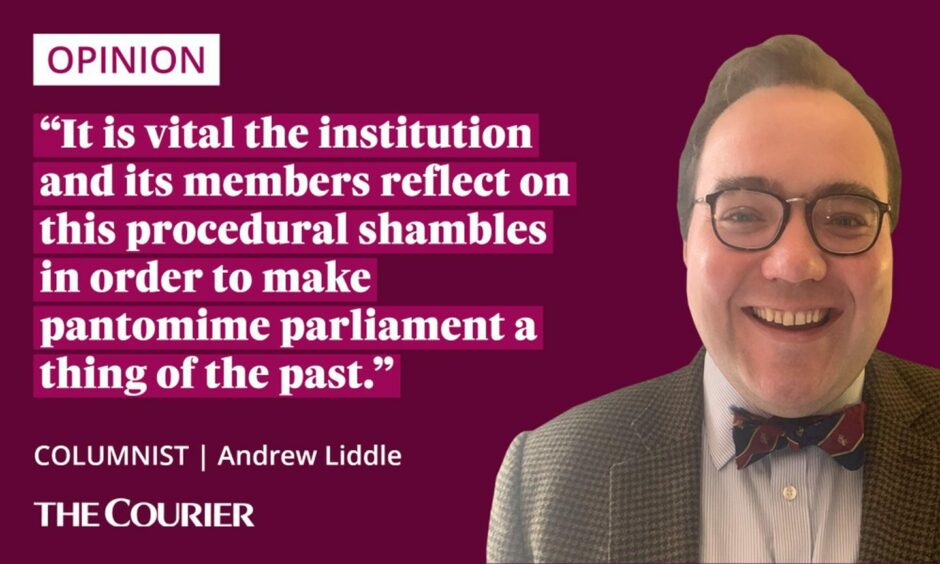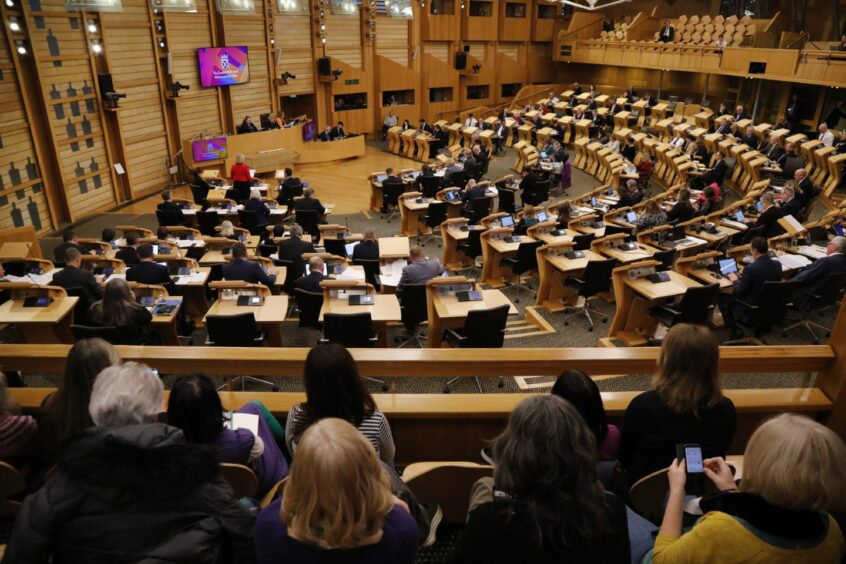Let me start with an apology. I had hoped – given the time of year – to do this column on a festive subject.
I had thought perhaps of writing something heartwarming about the power of community at Christmas, or something tongue-in-cheek about the culinary abomination that is roast turkey.
But, sadly for me – and quite possibly you – the parliamentary pantomime of the recent Gender Recognition Reform Bill simply could not pass without comment.
I do not propose to discuss the substance of the issue in depth.
There has been plenty of that discourse elsewhere and, indeed, as an issue of conscience, everyone will have their own sincerely held perspective.

It has also been a bone of contention in Scottish politics for several years, meaning that if you don’t know where you stand now, you probably never will.
For what it is worth I – and I would think most people – support the general principles of the bill, but would have liked to see more safeguards and reviews in place.
But whatever your view on the substance, we can all surely agree that the Scottish Parliament and its members utterly failed on the form.
Gender Recognition Reform bill wasn’t Holyrood’s finest hour
In terms of the parliament itself, the facilities and procedures were most definitely found wanting.
At one particularly slapstick point, the chamber lights – set on a timer – switched off mid-debate, plunging our hallowed representatives into literal if not quite metaphorical darkness.
At another point, and more sinisterly, parliament staff allegedly threatened protesters with arrest as they were evicted from the viewing gallery, only for others to later return.
Neither point reflected well on an institution that often likes to lecture others on due process and democratic rights.
Then there were the MSPs themselves who – barring a few notable exceptions – seemed to suffer a collective breakdown at the prospect of actually having to legislate on something serious.
Despite earning more than £66,000 a year before expenses – almost three times the starting salary of a nurse who will regularly have to work through the night, on their feet, without a break and without complaint – we were told how shocking it was that the debate would run into the late evening.
How it was unacceptable it would continue over several days.
And how devastating it was that – yes –Holyrood’s carol concert had to be cancelled.
The caveat that the Scottish Parliament only sits three days per week, usually finishing at 5pm, for just about 35 weeks a year, was unsurprisingly missing from many of these complaints.
Of course, some of this can be dismissed as parliamentary tactics – the Scottish Conservatives attempted to filibuster the bill – but not all.
Holyrood should look to Westminster after gender reform debacle
Given this charade, it is hard to escape the view that – for all Nationalists like to dismiss Westminster as archaic – there is actually still a lot Holyrood and its members could learn from the Mother of All Parliaments.
As an institution it is better at robust debate and scrutiny than the Scottish Parliament, and its members are more committed and more independent-minded than their devolved counterparts.
It also works longer hours and wastes far less time on meaningless debate, meaning there is much more time for MPs to examine legislation and, indeed, reach a consensus.
Of course, it remains far from perfect and much of its pomp and process seems out of step with modern Britain.
But the Scottish Parliament should recognise that there is more to being an effective legislature than electronic voting and allowing breastfeeding in the chamber.
This should be a learning moment for Holyrood
Critics may counter by highlighting some of the genuinely groundbreaking and important legislation the Scottish Parliament has passed.
But the reality is much of this – such as the smoking ban – was not particularly contentious.
Indeed, when it comes to dealing with contentious legislation, the Scottish Parliament’s record is woeful.
The SNP’s 2012 Football Act, for example, bulldozed through by its majority of uncritical backbenchers, was so damaging it had to be repealed six years later.
The moment a protester shouts "if you will not be decent, then I will be indecent" and flashes artificial pubic hair to the Holyrood chamber, after the Gender Recognition Reform Bill is passed. @STVNews pic.twitter.com/rIpJ6xZSrM
— Laura Alderman (@LauraAlderman_) December 22, 2022
A similar situation is developing with the Gender Recognition Reform Bill where it seems – rightly or wrongly – the UK Government may intervene to block the legislation, further delaying the possibility of progress and closure for the very people the bill was designed to help.
The Scottish Parliament is not beyond redemption.
In its current incarnation it is a young institution, with just over 20 years of experience behind it, and it is still developing.
It has talented and committed MSPs across all parties, and there is a genuine willingness to make improvements.
In the interests of good governance, it is vital the institution and its members reflect on this procedural shambles in order to make pantomime parliament a thing of the past.















Conversation